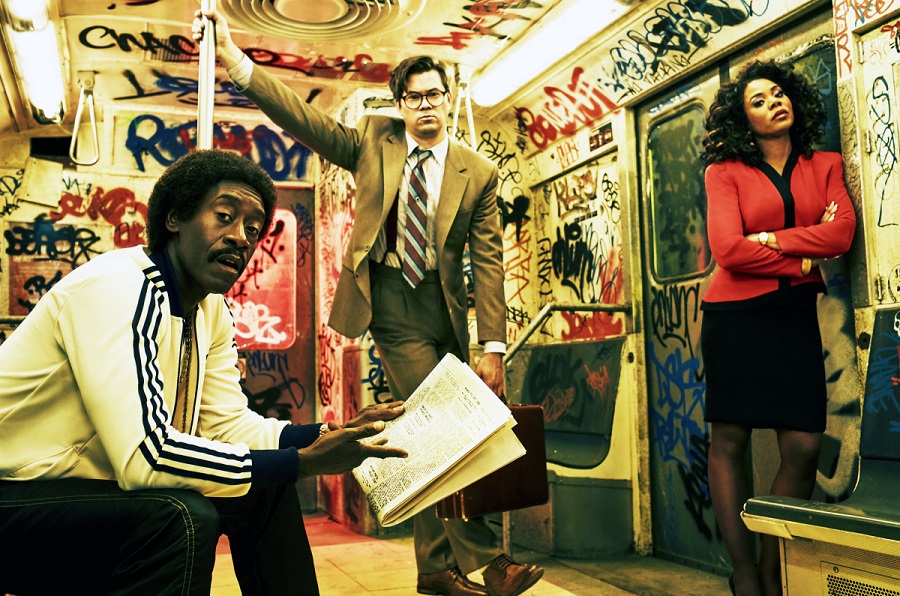The first major TV disappointment of 2019 is here in Showtime’s disjointed, frustrating comedy “Black Monday,” a show with an incredible ensemble of talented actors but as little focus as its cocaine-addled characters. With a premiere episode directed by Seth Rogen & Evan Goldberg, a clever enough concept, and this cast, how could “Black Monday” fail? It’s just further proof that you can gather some of the most likable actors in the same room, but the show still won’t work if you don’t give them something interesting to do. The show improves greatly in the second episode (although it dips back a bit in the third), so there’s reason to hope that this ragtag group of traders gets their comedic shit together, but I wouldn’t buy this TV stock quite yet.

If you’re too young to remember the actual Black Monday, the title refers to the worst stock market crash in Wall Street history on October 19, 1987. Creators David Caspe and Jordan Cahan open on that nightmare of a day when stock brokers literally leapt from their Wall Street windows, flashing back with a promise to detail how and why the still-mysterious crash happened. From scene one, the show plays fast and loose with ‘80s fashion and style, amping up the hairdos, tightening the blue jeans, and sprinkling cocaine over almost everything. At times, it plays almost like a parody of the ’80s, like Oliver Stone’s “Wall Street” (which is actually rather humorously a part of the plot of episode two) mixed through the lens of VH1’s “I Love the ‘80s.”
The great Don Cheadle stars as Maurice Monroe, the head of a Wall Street firm called The Jammer Group. Mo is a loudmouth scam artist, the kind of guy who drives a Lamborghini Limousine, and barely flinches when someone points out how ridiculous that is because it doesn’t give the speed of the former or the comfort of the latter. Cocaine, strippers, a robot butler—Mo is almost a variation on Jordan Belfort from “The Wolf of Wall Street.” Except this is a TV show, so Mo can’t quite be that cutthroat or that interesting, coming off more as a caricature than someone genuine. Cheadle tries his best to ground Mo—and there’s every reason to believe he’ll find the nuance missing from this character over the first three episodes, but I can only judge what I’ve seen and I found Mo far more annoying than I did engaging. Like really, really annoying.
Making out much better and pretty much stealing the show is the great Regina Hall as Mo’s longtime partner (and possible love interest) Dawn. Hall can ground a ridiculous moment or sell an overwritten scene like nobody else, and she walks away with “Black Monday” almost every time she’s on screen. Sadly, the typically excellent Andrew Rannells (“Girls”) isn’t so lucky yet, floundering as the new kid at the company who’s in way over his head. The supporting cast is filled out with people I typically love including Casey Wilson, Paul Scheer, Ken Marino, and Horatio Sanz.

Most damagingly, “Black Monday” is a show in search of a tone. The first episode is particularly scattershot, jumping wildly among its characters and mistaking fast-talking for saying something interesting. Rogen and Goldberg simply lose the handle on what we should care about in this half-hour and I was actively annoyed by it. Now, much to my surprise, the second episode, directed by Charles Stone III (“Uncle Drew”) finds its footing much better, although it still doesn’t quite live up to the potential of this ensemble. And then the third episode dips back to goofy behavior that betrayed the real emotion I think the writers are attempting, especially in a subplot involving Scheer’s character that can’t find the right tone. Sometimes a comedy falls into a gap between parody and realism, usually because it wants to be both and doesn’t develop enough of either. It wants us to laugh at the excess of characters who are larger than life but then respond to emotional beats as if they’re not caricatures in the next scene.
Now, this is an easily fixable problem. Many of the greatest comedies of all time started off on rocky terrain, often before the writers knew how to write to the strengths of their ensemble. Casting is so much of the battle when it comes to winning the comedy fight. If the writers behind “Black Monday” can wrestle their tonal problems into something more enjoyable, they’ve got the right people to make this show great. Right now, they just don’t have enough comedy capital to close the sale.
The first three episodes of the first season screened for review.












